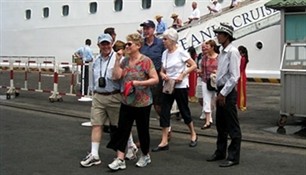Vietnam’s tourism industry set a record last year by attracting 6 million foreign visitors. The sector will officially launch a new strategy this year with a new logo and the slogan “Vietnam-timeless charm”.
 |
| Visitors to Da Nang city |
The slogan “Vietnam –Timeless Charm” and the symbol of a five petal lotus have been officially selected as the Slogan and Logo of Vietnam Tourism in the 2012–2015 period. The formalized lotus with five petals and five colours represents Vietnam’s major tourism products - island and sea tourism, ecological tourism and nature, cultural tourism, historical tourism and adventure tourism. According to Head of the Vietnam National Administration of Tourism, Nguyen Van Tuan, the sector will launch programs to introduce the new logo to domestic and foreign tourists. "Beside many challenges, Vietnam’s touris also enjoys advantages especially Ha Long Bay’s recognition as one of the 7 new natural wonders of the world. This will attract more visitors, so we should take this opportunity to promote tourism not just at Ha Long Bay but all over Vietnam. We have set a target of attracting 6.6 million foreign and 32 million domestic tourists this year with expected revenues of 7 billion USD", Tuan said.
This year, Vietnam’s tourism will officially implement a new strategy until 2020 with a vision toward 2030 and work out a number of plans to develop key tourism areas. Under the strategy, by 2020, tourism will have become a spearhead economic sector with high professionalism, comprehensive and modern infrastructure and high-quality products reflecting the national character and competitiveness with other countries in the region. Mr. Nguyen Van Tuan elaborated: "We will keep improving the quality of service and the tourism environment. Promotion programs will continue inside and outside the country. Socio-economic efficiency is the ultimate target and enterprises are the impetus for sustainable development. Building tourism products and promoting trademarks are breakthrough factors. Those are the lessons we learned from the tourism strategy over the last 10 years."
Vietnam’s new tourism strategy has several new points: growth, quality, trademarks, professionalism and efficient use of all resources and national advantages. The strategy particularly focuses on developing trademarks, a key factor in international competition. The sector has identified specialized forms of tourism such as ecological tourism and cultural tourism. La Quoc Khanh, Deputy Head of Ho Chi Minh city’s Department of Culture, Sports and Tourism says that green tourism will be one of the main products that the city offers: "There will be some tourism itineraries from Ho Chi Minh city to Cu Chi Tunnel, Binh Duong and along the Sai Gon river. We are organizing tours to explore forests in Can Gio by boat. This tourism form exploits ecology while protecting the environment and ensuring sustainable development."
The tourism sector has divided its markets according to the customers’ interests and budget. In the domestic market, the main focus will be on resorts, recreation areas and shopping. For the overseas market, the sector aims to expand its operations into more foreign markets like Northeastern Asia, Asia-Pacific, Western Europe and North America. Vietnam aims to welcome 10.5 million foreign and 48 million domestic tourists with estimated revenues of 19 billion USD by 2020.